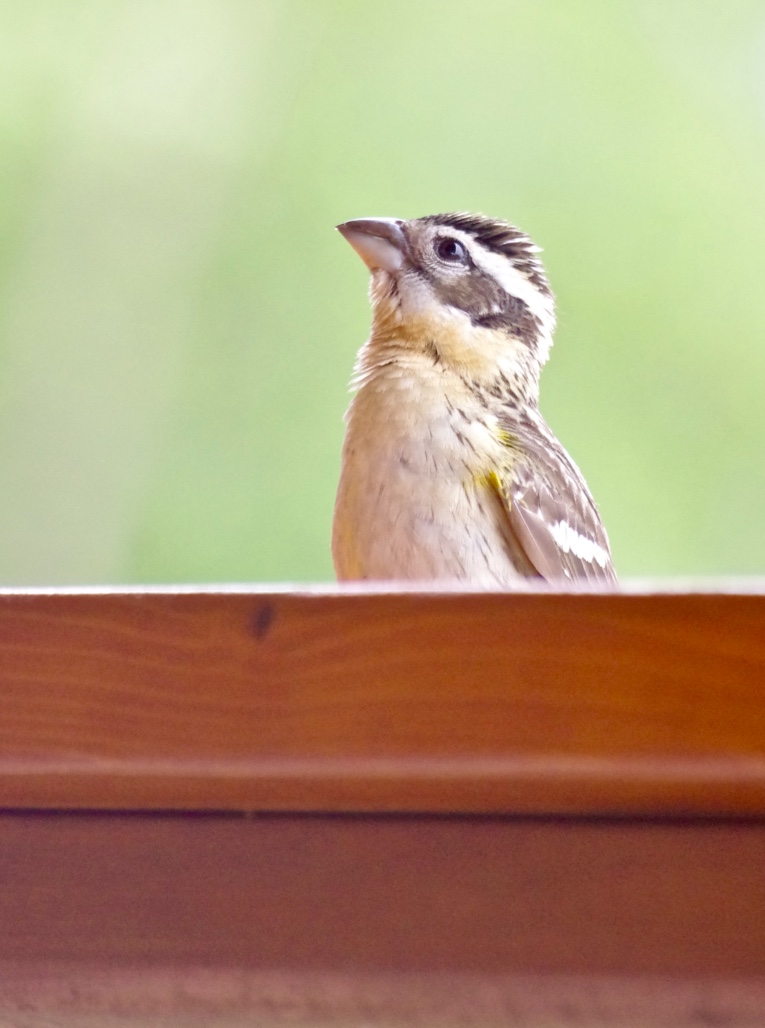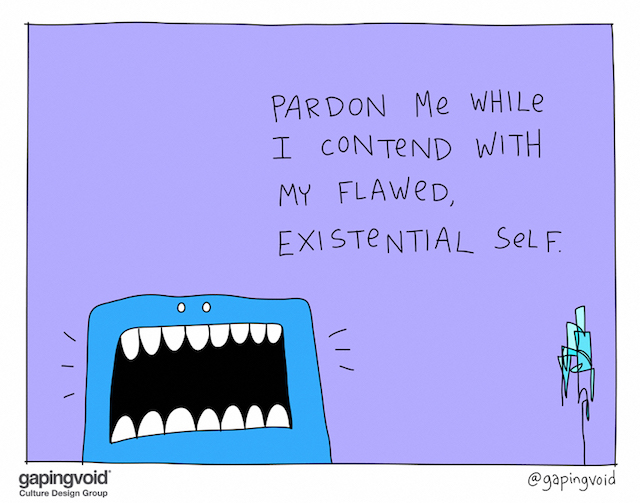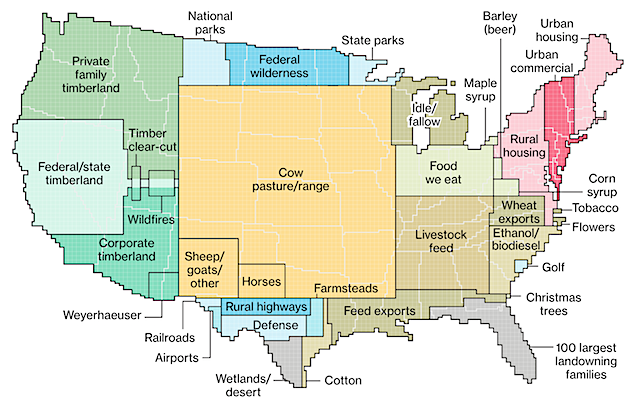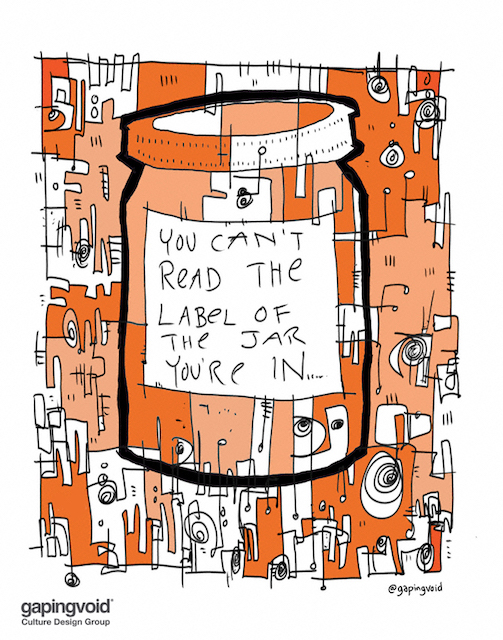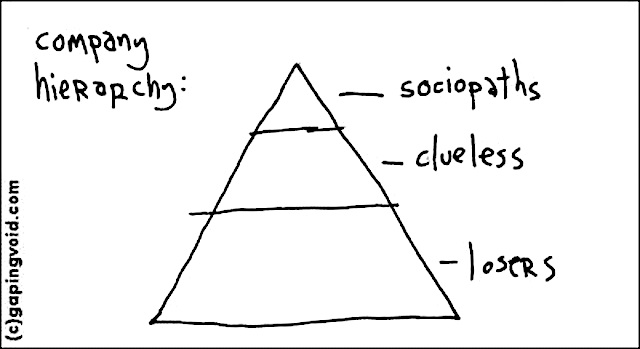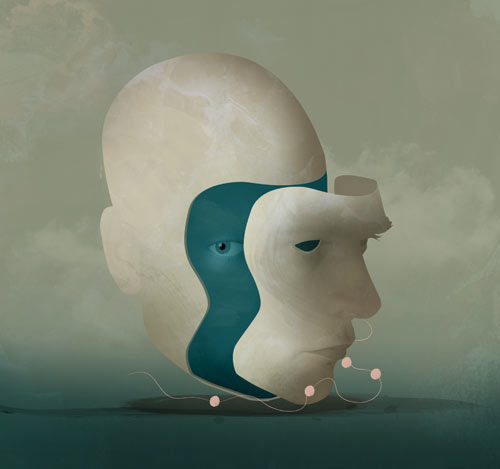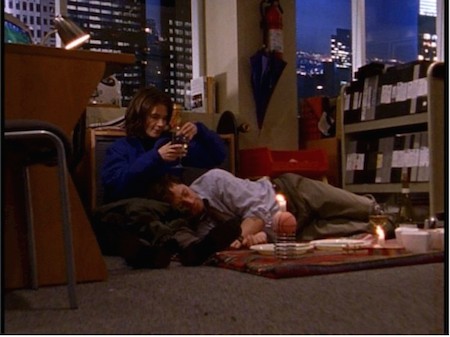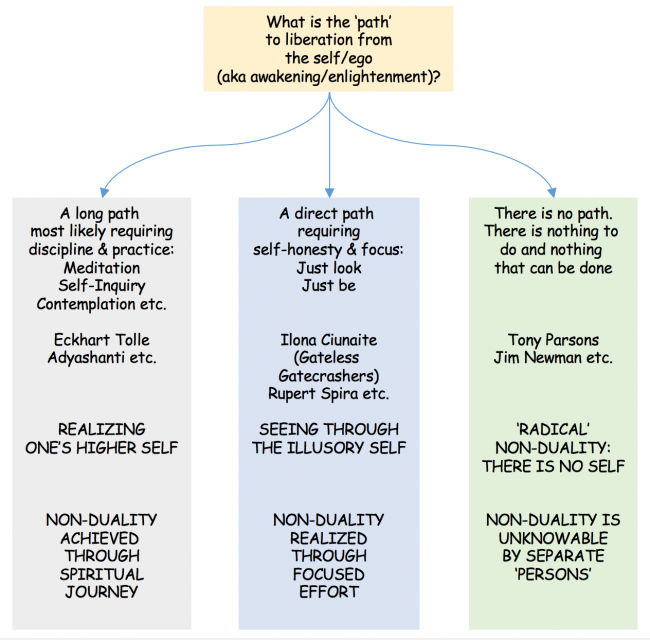
image from Pixabay, CC0
(Scene One: Mid-afternoon, summer. The main floor of a small, open concept house. A forest is visible through the picture window; the sound of surf can be heard in the background.)
(Characters: Darien, an aging hippie, taken to wearing cutoffs and sandals. Seville, Darien’s (step-)daughter.)
(Darien is standing in the kitchen, looking at some pages on the counter.)
DARIEN: (reading aloud) “Great inequalities of wealth, of health, of power, of voice, of security and of opportunity are unsustainable and inhuman; they must end. The poor, the sick, the threatened, the ignored, the helpless, the uneducated, the uninformed, the misinformed, and those living without hope did not choose to be that way. They are preyed upon by a system that exploits and intensifies their misery and inexorably increases these inequalities. That system is untrammelled, unregulated, undemocratic, oligarchic, unsustainable industrial capitalism. That system is destroying our environment, our social fabric, and our very civilization. We have no option but to strive urgently to find a better way to live and to be.” (raises his eyebrows)
(Seville enters, heads for the refrigerator and pulls out the makings of a peanut butter sandwich)
SEVILLE: Hey! You found my speech. I wrote it for Bernie Sanders. But you have to read it with more conviction than that.
DARIEN: Hmm. Sadly, you may have actually found a way to make him even more unelectable than he already was. But it would be a great speech. Ground-breaking.
SEVILLE: Thanks. (beat) I was doing stretches after my run in the forest, and this woman came up to me and told me that the meaning of life rests in “the Five W’s”. I think she was high.
DARIEN: Huh. You mean Who What When Where and Why? Must be a journalist. You have to be high to do a job like that these days.
SEVILLE: No, not those Five W’s. She was pretty cool but also kinda scary. She sat down in front of me and started making marks in the sand with a stick, and telling me that it was important to understand that until humans learn to pay attention to the Five W’s there is no hope for us. She acted like she was a shaman imparting secret wisdom. You wanna know that the Five W’s are?
DARIEN: (shrugging) Sure. Enlighten me.
SEVILLE: Sit down, grasshopper, and I will tell you the eternal knowledge of the grandmothers. Or one stoned grandmother anyway.
(he sits; she takes a bite of her sandwich, and takes five glass beads from a dish on the table, placing them in a line and moving each as she speaks.)
SEVILLE: The first W is Water. Without it there can be no life. We are polluting it, wasting it, and running out of it, using it for mining and irrigation and concrete and cooling electrical generators (40% of it is used for that alone), almonds, walnuts and meat products. Flushing and washing and drinking is just a tiny portion of our water use.
The second W is Woods — forests. Without them there can be no life. They are essential to many species on which we depend, and are part of the respiratory and hydrological systems that all life needs. And we need them for our health, physical and psychological. They were our home for our first million years.
The third W is We. Humans are not meant to live or do anything alone. We are social creatures, and we have lost our sense of community, of belonging.
The fourth W is Wellness. Not just being well, but doing things well, becoming competent at things essential to our well-being.
And the fifth W is Wonder. Not “wondering why” but just having a sense of wonder, appreciation, awareness and attention.
That’s what she told me.
DARIEN: (looks impressed) That’s awesome. You remembered all that from what she said? You should have invited her over.
SEVILLE: She was high, Dad. And yes, I remembered it all. It’s all a matter of paying attention, listening. You can remember a lot if you want to. (Exaggerated grin.) You should try it sometime.
(Darien returns the exaggerated smile, gets up and puts on a kettle.)
SEVILLE: I’ve made a first pass at the ‘Elevator Pitch’ to explain non-duality to our unsuspecting and cynical world. I wrote it mainly for you, since I’m not as convinced as you are that it’s true. Instead of having to explain it over and over, I thought it might be easier if you just had a one-minute script that laid it all out.
DARIEN: Thanks. Look forward to reading it.
SEVILLE: You have to memorize it. You can do it. It’s important to you, so if there ever was a time to learn a script by heart, this is it. And by the way, I want to go with you when Non-Duality Dude comes to town. I mean, philosophers like Daniel Dennett seem so smart, but they don’t seem to get the idea that determinism and compatibilism are completely irrelevant to the question of free will if you acknowledge that there’s no ‘one’ to have free will and that all causation is just appearance. Yet Daniel blithely dismisses radical non-duality as ‘mad-dog reductionism’, and then goes on to tie himself in knots every bit as complicated as the ones Sam Harris does — both of them desperate to justify the moral argument that we are ‘kind of’ responsible, to some degree or other, for our actions, even though we have no free will. Why can’t they see how ridiculous those arguments are? (She retrieves a sheet of paper from her backpack) I mean, listen to this from Sam Harris: (reading)
Consciousness is already free of the feeling that we call “I.” However, a person must change his plane of focus to realize this. Some practices can facilitate this shift in awareness, but there is no truly gradual path that leads there. Many longtime meditators seem completely unaware that these two planes of focus exist… . I used to be one of them.
I’d stay on retreat for a few weeks or months at a time, being mindful of the breath and other sense objects, thinking that if I just got closer to the raw data of experience, a breakthrough would occur. Occasionally, a breakthrough did occur: In a moment of seeing, for instance, there would be pure seeing, and consciousness would appear momentarily free of any feeling to which the notion of a “self” could be attached. But then the experience would fade, and I couldn’t get back there at will. There was nothing to do but return to meditating dualistically on contents of consciousness, with self-transcendence as a distant goal.
However, from the non-dual side, ordinary consciousness—the very awareness that you and I are experiencing in this conversation—is already free of self. And this can be pointed out directly, and recognized again and again, as one’s only form of practice. So gradual approaches are, almost by definition, misleading. And yet this is where everyone starts. In criticizing this kind of practice, someone like Eckhart Tolle is echoing the non-dualistic teachings one finds in traditions such as Advaita Vedanta, Zen (sometimes), and Dzogchen. Many of these teachings can sound paradoxical: You can’t get there from here. The self that you think you are isn’t going to meditate itself into a new condition. This is true, but it’s not always useful. The path is too steep.
SEVILLE: Pffft! Talk about pretzel logic. And they’re all the same, these old white guy philosophers and theoretical scientists and dilettantes — Daniel and Sam and David Chalmers and Ian Stewart and Jack Cohen and John Gray and Michael Pollan and David Foster Wallace and Robert Sapolsky, saying on the one hand there is no real ‘self’ and no free will but somehow there is still responsibility and control and a ‘you’ that has them and can ‘kind of’ choose to exercise them. What’s with these guys? Why do they have to make it more difficult than it is? Why are they so invested in a barren and bankrupt line of thinking? Deep-rooted moral upbringing? Desperation to be ‘useful’? (exasperated sigh) Sorry, I just expect better of the world’s supposed leading thinkers.
DARIEN: (beat) My head is spinning. (He comes back to the table with 2 cups of tea.) Context please.
SEVILLE: (reaching into her bag and pulling out a file which she puts in front of him) Daniel Dennett’s critique of Sam Harris’ book Free Will. You’ll hate it.
DARIEN: Actually, I’ve read it. It wasn’t any worse than any of the other attempts to reconcile determinism with a ‘kind of’ free will. Futile, of course, but they’re sincere.
SEVILLE: That’s why I want to go with you to meet Non-Duality Dude. I don’t want sincere, I want uncompromising. If my whole worldview is going to be turned upside-down, I don’t want half-baked reassurances. I want the truth. And that new article by that quantum theorist guy Sean Carroll you pointed me to last week about why the universe is the way it is, that provides five possible answers, and then concludes that his current favourite is that “the universe just is”, I liked that! (she pulls out more papers from her bag) Especially this part: (reading)
You want to know why the universe is, you’re not going to get a satisfactory answer. You’re not going to be happy. The universe just is. You have to accept it. You have to learn to deal with it. There’s nothing further there. I like this. I mean I don’t like it sort of you know in terms of again scratching explanatory itches. But I think it’s the one that is most courageous, most brave. It faces up to the reality of it. All of these other attempts hit this little kid problem of saying, ‘Well, if that’s true, why is that true? Why is that true? Why is that true?’ And here you’re saying, nope. There is one level at which you just say, that’s how it is. There is nothing other than that. This is what Bertrand Russell was trying to say. I think this is probably the right answer. And I know that people don’t like it, but whether we like it or not, is not part of how we should judge a theory of why the universe is the way it is.
SEVILLE: The scientists are ahead of the philosophers, which is amazing since they have so much more to lose. This is a huge step forward from Sean’s multiverse theory, and he was so invested in that. He’s a theoretical physicist, and he’s largely debunked string theory, and now he’s saying “the universe just is”? It’s positively non-dualist.
DARIEN: Maybe. I wonder if he’s just tweaking his theoretical physics colleagues to come up with something better. One of the main criticisms of string theory is that it’s unprovable, and useless. The same criticism could, and probably will, be levelled at non-duality. Just as in Copernicus’ day, no one will care about any theory, no matter how astute, that doesn’t either substantiate their experience or give them solace. Science is built on the former, and spirituality on the latter. Radical non-duality offers neither.
SEVILLE: Radical non-duality also says people can’t choose what they want or believe or do. And they generally tend to burn heretics. But heliocentrism eventually proved a very useful theory, since it turned out to represent reality better than geocentrism. It only took a century. I think non-duality will eventually prove to be useful. Not to science and technology, but to those who have outgrown spirituality and are looking for a better representation of reality than gods and quarks and strings. We’re all inveterate searchers, you know. (beat) Now, (pulling a paper from her bag) here’s the Elevator Pitch on non-duality for you to memorize.
DARIEN: (flips the paper back and forth and looks astonished) I’m going to memorize all this?
SEVILLE: (exasperated) It’s two pages, for god’s sake. Try. I’ll help you with it. Actors have to memorize a hundred times this much. I even put it in “Several Short Sentences” style, ’cause I know you like that, and you can learn the lines by number. (beat) (rises) Gotta go — meeting Kari at the Coffee Cup and taking KT for a walk.
(Seville picks up her backpack and leaves)
DARIEN: (sighs, then reads)
- There is no ‘you’, no ‘person’, nothing separate.
- ‘This’ is everything, timeless, limitless, eternal.
- Our sense of identity and separation is ephemeral, illusory. It appears to arise in creatures with large complex brains that have (perhaps as an extension of the survival instinct) evolved the capacity to create a model of reality that includes a ‘self’ at the centre of that reality, and then to mistake that representation for the ‘real’ reality. It mistakes the map for the territory.
- That sense of separation emerges in humans at a very young age and is then reinforced by others suffering from the same illusion of separateness, for their entire life.
- It’s a very compelling and enduring illusion, since human brains are largely dedicated to try to make sense of everything they perceive and quickly get into shortcut “default settings” in their beliefs of what is and what is happening.
- This sense-making by separate selves entails the creation, as part of the representation of reality, of the ideas of space and time (here and now and elsewhere and past and future). That sense-making is what we call ‘experience’. But all ‘experience’ is, is imagined occurrences within the representation of reality dreamt up by the brain, as it tries to make sense of ‘this’, of everything.
- It can happen that the model, the simplified representation of reality conjured up by the brain with its invented separate self, can fall away, though there is no path to that happening, and it doesn’t happen in time, or to any ‘one’ .
- When that happens, nothing actually changes — it was all imagined. The apparent character or body continues to behave seemingly exactly as it did before, based on its embodied and cultural conditioning. The appearance of self-control, choice, and free will is simply an after-the-fact rationalization within the mental model of what was already going to occur, and that choice never existed in ‘real’ reality.
- When the sense of a separate self is no more, the only thing that might really change is that some of the energy that emerged as neurotic embodied and conditioned behaviour in the character, due to the self’s anxiety-creating belief it has control and free will, may begin to dissipate, since there is no longer a separate self to take ownership of the neurotic thoughts and feelings.
- But otherwise no one is likely to notice any change in the no longer self-afflicted character. It is as if a pervasive long-term hallucination suddenly no longer haunts the character.
- All that is left is ‘this’, everything, and the sense of wonder that its realization evokes, but in no one.
- There is only ‘this’, no thing apart, nothing separate, no time or space, no purpose or meaning, no life or death. Nothing is needed, nothing is missing, nothing actually ‘happens’.
- The separate self cannot imagine or realize this because it cannot conceive of its own absence, other than when the body and brain, which it presumes to inhabit, cease to function.
- But there may be ‘glimpses’ where there is, briefly, no self, no separateness, no time passing, just everything. When that’s seen, it’s awesome, unconditional, and unquestionably true.
- That is what the separate self longs for, seeks hopelessly to find for itself, through therapy or religion or spiritual practices, and can never find.
- This is not to say that there is no reality external to our selves, our brains. In fact everything real is external to our brains; ‘all there is’ has no need of ‘consciousness’.
- But real reality is not what we perceive: it has no separate objects with boundaries where they end and something else begins, no colours or sounds or smells or tastes as we perceive them, no time or space in which anything happens. It is just an infinite, eternal, empty field in which everything apparently happens, wondrous and unperceivable by, and indescribable to, the separate self.
- How do I ‘know’ this? ‘I’ don’t. Some instinct inside me, some remembering in glimpses, makes it completely clear, obvious even, that this is true.
- But obviously, ‘I’ cannot hope to convince anyone else of its truth. But it’s what just about everyone who claims to be ‘enlightened’ or ‘liberated’ is clearly describing, in different ways.
- The only difference is that they mostly believe it’s something that individuals — selves — can attain. But they cannot.
(he puts his hands over his eyes)
(fade to black)
(Scene Two: A few days later; evening. Seville is lying on the couch watching a movie through a 3D headset. Darien is staring out the window at the forest.)
SEVILLE: Dad, can I ask you a question?
DARIEN: (beat) Huh? Sorry, I thought you were watching a movie.
SEVILLE: I am watching a movie. But I have the sound off. It’s how I always watch movies now. They have amazing special effects, and the UHD is awesome, as are the sets and costumes, but the writing and the acting and the music — pffff! — are invariably manipulative, predictable, derivative crap. So I just watch the picture and make up my own dialogue and soundtrack. Waaay better than anything the hacks could come up with. You should try it. You’ve got a great imagination. Right now, in my movie, Mackenzie Foy and Anne Hathaway are explaining quantum gravity and complexity theory to Matthew McConaughey. The actual plot is utterly ridiculous, but when you substitute lines from McConaughey’s quirky character in True Detective, for the lines he says in this sad little film, it gets quite interesting. Like, remember when McConaughey as Rust does the no-self monologue? (faking a Southern male accent) “I think human consciousness is a tragic misstep in evolution. We became too self-aware. Nature created an aspect of nature separate from itself — we are creatures that should not exist by natural law. We are things that labor under the illusion of having a self; an accretion of sensory experience and feeling, programmed with total assurance that we are each somebody, when in fact everybody is nobody.” (back to normal voice) Awesome. (she removes the 3D visor) Anyway, I have a question for you.
DARIEN: OK, shoot.
SEVILLE: The question is, Do you really believe Non-Duality Dude’s message, or do you just want to believe it?
DARIEN: (looking puzzled) (beat) Not sure I understand. What do you mean? I can appreciate it on an intellectual level, but I don’t pretend that I really get it, or that ‘I’ ever can.
SEVILLE: What I mean is, is this world just so fucked-up that you want to believe in the message because it makes all the horror and suffering moot, relieves you of responsibility and assuages your guilt and fear about what what people have done to this planet — and what is to come? Is it just your way of inuring yourself from the pain of Civilization Disease? I’m asking because you’ve described these glimpses of non-self, and they seem compelling, but my self has never fallen away to allow a glimpse, as far as I know. Maybe the glimpse was just a moment of quiet bliss that you wanted to be a glimpse?
DARIEN: Hmmm. I’ve considered that. It’s possible. I certainly do want to believe the radical non-duality message is true. But at the time the glimpse was ‘obviously’ more than just a moment of bliss. It was an ‘aha’ moment, a moment of true realization, and enormous relief. It made what was intuitive to me suddenly absolutely clear — that it just didn’t make sense that the world was so full of fear, violence, suffering, struggle and sorrow, and there had to be another explanation for the way things are. I know people who have suddenly become religious, and it wasn’t like that at all. It’s not a breaking down or a giving up or a letting go, it’s a seeing through. So yes, it’s possible, but at this point it seems unlikely that it’s just wishful thinking. (beat) You said you want to come to the meeting with ‘Non-Duality Dude’. What are you hoping will come out of that?
SEVILLE: (beat) Well, I don’t have any specific questions to ask. Whenever I think about the questions I have, I realize I already know the answers to them. The message is actually pretty simple. So I think a meeting of radical non-dualists might be kinda like a support group for me. It’s hard being the only one in my crowd who believes something everyone else can’t even fathom. Present company excepted, of course.
DARIEN: I’m afraid you may be disappointed. It’s likely most of the people in the room will just be seeking more satisfying answers than the ones their gurus, teachers, priests and other spiritual advisors have given them. They’ll probably ask really elementary questions that will make you groan, questions that you already know the answers to.
SEVILLE: Hah! As if I’m not used to that. (beat) I get the intuitive thing, that it doesn’t make sense the world would be so awful. I appreciate the non-duality message’s simplicity and completeness and elegance and the fact that scientists and philosophers are converging on the same mind-boggling realizations that non-duality has been asserting for a long time. I love being ahead of that curve. But while I really want to believe the non-duality message, and I’m ‘clear’ on it, my dissatisfaction and impatience is more than just my self’s resistance. On the one hand, I am afraid of living my whole life as a lie, a story, a dream, behind the veil of the self; and on the other hand I’m just as afraid of losing the intellectual, emotional and sensual ‘highs’ of new discoveries and sensations and experiences and falling in love with another person, damn it, and having them love me, too, this person, illusory or not. I don’t want to miss out, you know. I’m too young to be a monk. (grim face)
DARIEN: Except… there is no you. No you to miss out, no you to fall in love, no you to suffer or feel joy. If that was realized, seen, then there would still be love and joy and fear and anger and sorrow, but it wouldn’t be personal, wouldn’t be an experience. But it would be no less wondrous for that. You don’t have to be a monk. You don’t have to change anything. In fact, you can’t. What the amazing character called Sevi will do and be, she will do and be, and ‘you’ actually have no say in the matter. ‘You’ are just in the way of the wonder of that amazing character simply being who she is.
SEVILLE: (sighs) Non-Duality Dude says the self can’t do anything but seek, and in the process struggle and suffer except for brief moments of happiness. It’s one thing to be clear on that. It’s another thing entirely to live by and with that knowledge. Maybe it would be better not to know. (beat) Nah, ‘I’ just have to know. It’s in my conditioning. (beat) I thought I was a phenomenologist until Non-Duality Dude came along. Remember reading Spell of the Sensuous together? (she pulls a sheet out of her bag) Remember when it was simple as believing this? (reads)
Tribal cultures and other creatures appear to see, feel, and perceive the world in a fundamentally different, and more profound way, than we do in our modern Western culture. The invention of the written alphabet, and through it the invention of the concepts of absolute space and separate, linear time, and our conception of the air which surrounds us as merely empty space — allowed Western man to create a separate, thoroughly plausible, abstract reality, that, in the civilized world, with its need for hierarchy, laws, instructions, rules, and restrictions, was (and is) a more useful reality than the ‘real’ one. Over time, this abstracted reality and its artefacts have dulled our sensitivity, our awareness of and ability to reconnect with the ‘real’ world, the sensual world of which we are inextricably a part, and upon which our survival utterly depends, but which we are ever more unaware of, indifferent to, and detached from…
Today the speaking self looks out at a purely ‘exterior’ nature from a purely ‘interior’ zone, presumably located somewhere inside the physical body or brain. Within alphabetic civilization, virtually every human psyche construes itself as just such an individual ‘interior’, a private mind or consciousness unrelated to the other minds that surround it, or to the environing earth. For there is no longer any common medium, no reciprocity, no respiration between the inside and the outside. There is no longer any flow between the self-reflexive domain of alphabetized awareness, and all that exceeds or subtends this determinate realm. Between consciousness and the unconscious. Between civilization and wilderness.
SEVILLE: Pretty good description of the affliction of the separate self, huh? David Abram thinks we can sense our way back, re-open ourselves, and re-become “animal”. Non-Duality Dude would say that’s just another type of seeking for another experience. Do you think tribal cultures at some point were free of selves?
DARIEN: No idea. Human cultures, even the earliest ones with a written record, seemed pretty preoccupied with the individual and with responsible behaviour. Human species are a million years old, human art is at least 100,000 years old, and abstract language merely 30,000 years old. If art is ‘self’-expression, then the illusion of self is pretty old. It really doesn’t matter. David’s take on being “animal” seems pretty consistent with what Eckhart Tolle and Adyashanti and all the others describe as being “enlightened”, and unlike ‘Non-Duality Dude’ they all believe and preach that there’s a path to getting there. So, pick your poison I suppose. It’s all the same message.
SEVILLE: (beat) (raises eyebrows and shrugs) And on that cheerful note I’m going back to my movie. (smiles) Thanks for the chat!
(Seville re-dons the VR headset and lies down on the couch)
(the phone rings; Darien answers it)
DARIEN: Hello? (beat) Oh, hi Dad, yes we’re fine. (beat) I told you, Dad, non-duality is not a cult and it’s not something I would, or could, force your granddaughter to believe. (beat) No, it’s not nihilistic and Sevi isn’t going to go out and commit murder and mayhem just because she believes we have no free will. I gave you the book and video list; didn’t that reassure you that there is ‘nothing’ to be concerned about? (smiles to himself)
(Seville on the couch smiles and waves one raised hand)
DARIEN: Sevi waves hi. (beat) No, I don’t know who she’s dating. But she’s safe, and wiser than I’ll ever be. (beat) What if I summarized for you what the message of non-duality really is; would that help you appreciate that it’s not a cult and that everything is fine? (beat) OK, here goes. It takes about two minutes to explain, and just stop me if you want anything clarified. OK?
(Darien begins saying the Elevator Pitch that Seville gave him; he’s memorized it. He interjects some reassuring words and a few hesitations, but gets through the whole list. As he finishes, Seville raises her hand with a ‘thumbs up’.)
(fade to black)
(Scene Three: A few days later: early afternoon. Darien is drinking tea and doing a crossword puzzle. Seville walks in, clearly agitated)
SEVILLE: Holy… Fuck!
(Darien watches her pace around the room but says nothing)
SEVILLE: I… just… don’t… fucking… believe… it! (surprised happy face and turned up hands)
DARIEN: Don’t tell me… They impeached the bastard!?
SEVILLE: A glimpse! I had a glimpse! On the beach! I mean… there was a glimpse; there was no ‘me’ to have it. You know what I mean. It happened!
DARIEN: Tell me more.
SEVILLE: I was just… Kari and I had… Well, we’d been making out and as usual Kari immediately fell asleep, and I was just lying there on the beach, in a kind of post-make-out bliss, staring at the waves. And suddenly, there was no me! There was no time! There was (beat) ‘only this’! (quietly) Only this. And it was so obvious. I mean, how could I not have seen it before? And I knew that it was the real reality, and that it was eternal and, how do I say this, it would ‘wait for me’ until my self was gone. And I remembered, if that is the word, other glimpses, from when I was really little, like when you took me to that ancient village with the hobbit-style houses and the eight-foot-high hedges, and the fluffy snowfall one night under the streetlight when there was no sound, no movement other than the snow, and all the other times. It was completely different from a blissed-out state. It was crystal clear, absolutely true. And it was, like, completely unlike what I had expected. It wasn’t a state. It wasn’t an experience. It wasn’t going anywhere. ‘I’ wasn’t there. It was just… everything! It was “seeing through”. Amazing and wondrous and… wow!
DARIEN: (nods and smiles) Sounds a bit familiar. So now what?
SEVILLE: (beat) Now, nothing I guess. Everything’s changed, but everything’s still the same. ‘I’ am back, but not feeling bad about that, though I might later, if it doesn’t happen again. (beat) And now I’m asking myself the same question I asked you last week: Was this a real glimpse, or did ‘I’ just want to believe it was? Was I just so desperate for a glimpse that I invented one? There was no ‘dark night of the soul’ happening for me, so why did it happen then? Did I just dream it, or did it show me that ‘my’ whole life is just a dream?
DARIEN: Really good questions. Alas, I have no answers. Maybe there aren’t any.
SEVILLE: (beat) (sighs) So now what?
DARIEN: I don’t know. Lunch? Play the Glass Bead Game? Show me how that VR thingy works? Lie down in front of the pipeline workers’ bulldozers? Tell me whether or not you’re in love with Kari?
SEVILLE: (gives Darien a hug) Lunch. Maybe burritos and veggies. I’m not in love. (beat) And the rest we’ll just have to take one step at a time. (beat) Oh, and that woman with the Five W’s? She is a shaman, or at least she says she is. And she was high. I ran into her again and she says she can guide me through a psilocybin trip. Want to do it with me? Might answer your Michael Pollan questions.
DARIEN: What if I let you do it first and then when I do it you can be my shaman, my guide. Seems kinda fitting, don’t you think?
SEVILLE: You’re just scared.
DARIEN: That too.
SEVILLE: But… there’s no ‘you’ to be scared! (sarcastic smile)
DARIEN: Right. But I’m well-conditioned. I have no control over what I feel.
SEVILLE: Hmmm. Somehow there’s a total logic disconnect there. OK, would you acknowledge that new knowledge can affect your conditioning?
DARIEN: Seems plausible.
SEVILLE: So for example, since I was little, new knowledge has changed what you think about whether we can prevent civilization’s collapse and climate change, and changed what you think about the nature of the human ‘self’, right?
DARIEN: Yeah.
SEVILLE: And that has changed your behaviour — for example, what you write about on your blog, right?
DARIEN: I guess, sure.
SEVILLE: So it’s possible that the knowledge that there’s no you and no free will might eventually change your fear-driven behaviour, no?
DARIEN: Not so sure. Maybe. Knowing something intellectually, when you’re bombarded with claims that your knowledge makes no sense, makes it lot less likely you’re going to change your behaviour, I would think.
SEVILLE: What are you scared of, exactly?
DARIEN: Hah. Do you want a list? It’s a long one.
SEVILLE: Underneath everything in the list, what is it you’re afraid of, and ‘who’ is it that’s afraid?
DARIEN: Suffering, I suppose. Yours, mine, other people’s…
SEVILLE: I’ve seen you suffer. You’re a bit loud, but you handle it pretty well when it happens. Geez, kidney stones, colitis attacks… You didn’t seem at all scared when they happened.
DARIEN: I guess when you’re in the middle of it, the fear gets replaced with coping with things in the moment.
SEVILLE: So let’s drill down a bit. So it’s the anticipation of suffering that underlies your fear. Right? You’ve said you’re not afraid of dying, as long as it’s not painful. You’ve said you’re afraid of being trapped, but that’s never really happened to you, has it? Even awful social events with strangers, even horrible work situations, when they happen you really cope with them quite well. “It wasn’t as bad as I thought” could be your mantra. So what is it that you’re really afraid of?
DARIEN: Well, doctor, I suppose it’s the fear of not knowing what’s going to happen and not being in control of the situation.
SEVILLE: But no one is in control, and ‘knowing’ is just the self’s pattern-making, sense-making. There is no real knowing and no control.
DARIEN: Well, exactly. That why everything is so scary. Anything awful could happen. It’s the anxiety underlying the fear that is unbearable.
SEVILLE: So who is it that’s anxious? (beat) I’m not trying to do a Byron Katie on you here, but who exactly is anxious about not knowing what’s going to happen and not being in control?
DARIEN: OK, it’s my ‘self’ that’s anxious. It’s my self that still thinks it knows things and is in control. My real fear is my self’s reaction to a possible unwanted situation.
SEVILLE; No wonder you want to believe so desperately that there is no self. If it would go away, everything would be perfect.
DARIEN: I guess. Though I already know intellectually that there is no self, and that everything is perfect.But that doesn’t overcome my conditioning, at least until or unless that self drops away.
SEVILLE: So you’re saying that your self is like a hallucination, that you know is not really real, but seems to be so you can’t ignore it?
DARIEN: Maybe. The self seems more profound than a hallucination. But you could be right.
SEVILLE: OK, other fears. Every once in a while you get really angry, and you’ve said anger is usually a mask for fear. What makes you angry?
DARIEN: These days, it’s mostly psychopaths in positions of power. Trump, Ford, Peterson, you know, scary guys with influence who do and say crazy things.
SEVILLE: So they’re ‘scary’. What are you afraid they’ll do?
DARIEN: Mmmm… Take away our freedom. Wars, fascist brownshirts, gulags, death squads, you know. It’s happened before.
SEVILLE: But ‘you’ have no freedom. You know that. (beat) Suppose the hippies had done everything they wanted last century, so we all lived in Eden. You’re not living in anguish afraid that some despot would take that freedom away and we’d be stuck with what we have today, are you? So what you’re really angry and afraid of losing is just something you imagine, something that never actually was or will be.
DARIEN: Huh. I think you’re too smart for me. I have no idea. I know my anger and fears and anxieties and anguish are unwarranted, but I can’t let go of them. My conditioning is too strong. I can’t not feel or think what I feel and think. My life is full of cognitive dissonance. That terrifying hallucination, conjuring up terrible imaginings of what might be, is just too present, too pervasive, for ‘me’ to ignore. I can’t will it or think it away. No reassurance makes it vanish. It’s triggered by all kinds of situations. And that hallucination kinda is me. That hallucination, that conditioned anxious seemingly-vulnerable self, and its reactions, is what I’m really afraid of.
SEVILLE: Remember when your brother took that Fear of Flying course and made it through one flight before the fear returned, and the pilot who ran the course admitted their success rate was next to zero? I guess that’s the same kind of hallucination, the same kind of unreal but un-ignorable ghost. So you think we’re just stuck with our ghosts, until the ‘self’ behind them disappears, or we die?
DARIEN: I guess. No one really dies, of course. There is no time. So there is no hope. But there is no self, either. They’re all ghosts, inventions, dreams.
SEVILLE: Well, I think we’ve made peace with ours better than most people. I suppose we’re fortunate in that sense. For some people, the ghost probably haunts them every moment of their lives.
DARIEN: I’m sure that’s true. Perhaps David Foster Wallace just found that ghost too unbearable, too pervasive, to live with. I’m sure the ghost is a lot less of a factor in my life than it was in the years before you were in my life. My self was really hard on me, and really scared, back then. Maybe Civilization Disease is just the affliction of the self, and some of us get it worse than others. And some of us heal somewhat, and a few are liberated from it entirely.
SEVILLE: So is there a question in all this for Non-Duality Dude when we go meet him? Or are we just going to go and compare symptoms with the other self-diagnosed people there? And listen to them ask him hopeless questions we already know the answers, or non-answers, to?
DARIEN: I don’t suppose we actually have any say in the matter.
SEVILLE: Uh uh. That’s a cop-out answer. My question is, given the state of your conditioning and the current circumstances as we understand them, will the character infected by your conditioned self apparently ask a question, and/or hobnob with the other participants, or just sit in the back row silently and be a smug silly bugger?
DARIEN: Smug silly bugger! I can identify with that! I think I’d be quite good at it.
SEVILLE: No you wouldn’t. You know too much and you care too much. I know what I’d like to see happen to you, whether or not non-duality helps or not. You ready? (she pulls out another piece of paper from her bag)
DARIEN: Always and never ready for your perceptive insights.
SEVILLE: (reading) 1. I’d like to see you as happy as you were in the year after you retired and let go of being an environmentalist. It was like you were weightless, and you took joy in everything. 2. I’d like to see you get past your fake misanthropy. Except for a lucky few like me, you shun people, on the basis you say they are ignorant and uninteresting. But underneath you know better. I think you’re scared of caring too much. And 3. I’d like to see you spend more time just paying attention, with all your senses. I think you’re scared of feeling. If radical non-duality helps you be happier, more caring, and more attentive, sign me up. If it doesn’t, let’s find something else. If I’m going to be an adult soon, I want you to be one too. (sad smile) (beat) So what would you like to see happen to me?
DARIEN: Hah! You’re already any father’s dream. What do I want to see happen to you…? I guess mostly I want you to be free. In the deepest and every sense of the word. Free to be, free to do, free of and from anything that constrains you and makes you unhappy. Come to think of it, that’s pretty much another way of saying what you want for me. Perhaps today’s ‘glimpse’ might have given you a sense of what that freedom might be like. Although I’m not sure the meeting with ‘Non-Duality Dude’ and the other attendees will make any difference to that. (beat) Seriously, if I were to write a play that had you as a character, just as you are, no one would believe that character could possibly be real.
SEVILLE: Um, what would the play be about? Hopefully not 45 minutes of the two characters talking about non-duality? — booooooooring!
DARIEN: You’re the one who watches movies with the sound off. Maybe it would be a play where the actors walk around a gesture and do things but don’t make a sound. The audience could make up the dialogue and the plot to suit themselves.
SEVILLE: I don’t think you have to go that far. What was it that Aaron Sorkin said made for great characters?
DARIEN: (counts the points off with his fingers) Show what your character wants or needs and how they overcome obstacles to get it. Have your characters fail early. Make sure your characters aren’t too good, that they have weaknesses and foibles. Make them driven, have them show that they really care. Have them find a creative, unorthodox, interesting way to overcome the obstacle. Use dialogue not action to convey the confrontations and power struggles. Have characters succeed, but at an unexpected cost. Have them learn something important about what matters in life. (beat) I think that was it.
SEVILLE: Yeeesh. Makes ’em sound like puppets. That list seems like a pretty cheap, lazy way to manipulate the audience into caring for the characters. Aaron’s earlier characters, like on Sports Night, were quirky, fun, clever, complex, and their problems were not terribly serious. You just wanted to be with them. God knows there’s enough struggle and suffering in the world without writers having to invent more of it. (beat) Hey! I have an idea. What if the play, instead of just being non-dualists blathering, was a play with characters who say they couldn’t write a play about characters like them? A recursive play about the ‘recursive self’?
DARIEN: Naaah. Too clever by half. Hmmm… The idea’s cute: Life is a script that the self gets only at the last minute, line by line, so write a play about characters who, in the script, are aware that their lives are just scripts that they get, only at the last minute, line by line. (beat) But the idea of dream-within-a-dream has been done, usually badly.
SEVILLE: But the difference here is that there is only the dream. There is ‘nothing’ (smiles) to wake up to. I think it has possibilities.
DARIEN: OK, I’ll play. It could start out with… me stumbling upon your speech for Bernie Sanders. And then there’d be some thoughts about the non-existence of the self and of free will, raising the cognitive dissonance between that and supporting an old idealistic politician as a kind of tension. (beat) And then maybe later… you could come in exclaiming that you’d had a glimpse… or at least that there had been a glimpse and that ‘you’ had briefly disappeared. And then the characters could acknowledge that they’re not real, just characters playing roles in a play, and have no control over the script, or even of what they’re going to say or do next. And they could tell the audience they’re not real either.
SEVILLE: Now that’s too clever by half.
DARIEN: But what’s the point? As you noted in your Elevator Pitch, I cannot hope to convince anyone else that any of this is true. Even though it’s what just about everyone who claims to be ‘enlightened’ or ‘liberated’ is clearly describing, in different ways. So what’s the point of annoying people by getting them to read or watch a play about something they can’t and won’t possibly believe?
SEVILLE: Yet Eckhart Tolle and Adyashanti and all those people don’t annoy people; they give them hope and inspiration.
DARIEN: And they do so sincerely and with the best of intentions, I know. But it’s cruel to give people hope that they can realize this, this disappearance of separation and self. They can’t realize it. There is no enlightenment or liberation for individuals.
SEVILLE: True. But it doesn’t matter that people won’t understand or believe you. You still have to tell them, deliver this preposterous, annoying message, don’t you? That’s your conditioning. It’s the only thing you can do. And when they read, or watch, they’ll do the only thing they can do, based on their conditioning. None of it matters. There are no minds to change. There is no one, either to give or to hear this message. There is nothing separate, no time. There is nothing happening. And yet it’s wondrous, amazing, this apparent life, even if ‘we’ are just characters reading our lines, playing our roles, not knowing what they’re going to say or do next until the script unfolds.
DARIEN: (beat) This character craves a chai, and, um… cole slaw, and raspberries over cashew ice cream.
SEVILLE: You making?
DARIEN: I have no choice in the matter.
SEVILLE: Then you have no choice but to make the same for me. And burritos.
DARIEN: (rises) Coming up.
SEVILLE: Apparently so. (reaching into her bag and taking out a file) (beat) I’ve written a play. Want to act in it?
DARIEN: As long as I don’t have to play myself.
SEVILLE: Promise. You don’t.
(fade to black)
